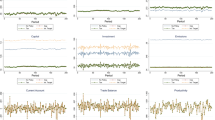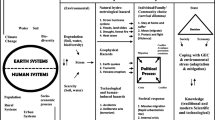Abstract
The present scale of production and consumption is likely to generate adverse externalities (pollution). The dangers posed by pollution infringe on the welfare of countries, depending on the type of environmental problems they face. While research is under way which links environmental degradation to the onset of civil and international war, this chapter shows how economic, technological, and ecological factors influence a country’s environmental security and which instruments can be employed to enhance it. After briefly reviewing the literature on the relationship between environmental degradation and the onset of civil and international conflict, the basic model of environmental regulation in a closed economy is developed; these assumptions are relaxed step by step by introducing transboundary pollution, international trade, and global environmental problems. Furthermore, the instruments for achieving environmental security are systematically derived.
Earlier versions of this chapter were presented at the 1995 Annual Meeting of the American Political Science Association, Chicago, IL, 31 August-3 September 1995, and the Second Polish-German Workshop on ‘The Security and Geopolitical Situation in Central and Eastern Europe’, Polish Office of National Security and German Federal Academy of Security Policy, Warsaw, 4–7 September 1995. I am grateful to the participants of these workshops for comments. In particular, I greatly appreciate comments received from Galina Churkina, Paul Diehl, Carsten Helm, Arno Hoogerwerf, Kathrin Heidbrink, Harold Jacobson, Valentina Krysanova, Urs Leimbacher, James Morrow, Eric Reinhardt, and Thomas Schelling on earlier versions. I remain solely responsible for the contents of the chapter.
Access this chapter
Tax calculation will be finalised at checkout
Purchases are for personal use only
Preview
Unable to display preview. Download preview PDF.
Similar content being viewed by others
References
Bächler, Günther; Volker Böge, Stefan Klötzli & Stephan Libiszewski, 1993. Umweltzerstörung: Krieg oder Kooperation? [Environmental Destruction: War or Cooperation]. Münster: Agenda.
Dabelko, Geoffrey D. & David D. Dabelko, 1995. Environmental Security: Issues of Conflict and Redefinition’, Environment and Security Debates: An Introduction, Environmental Change and Security Project Report, Woodrow Wilson Center, no. 1, Spring, pp. 3–13.
Durham, William H., 1979. Scarcity and Survival in Central America — Ecological Origins of the Soccer War. Stanford, CA: Stanford University Press.
Görrissen, Thorsten, 1990/91. Grenzüberschreitende Umweltzerstörung und europäische Sicherheit’ [Transboundary Destruction of the Environment and European Security], pp. 395–440 in Dieter S. Lutz, ed. Gemeinsame Sicherheit, Kollektive Sicherheit, Gemeinsamer Frieden. Baden-Baden: Nomos.
Grass, Rolf-Dieter & Wolfgang Stützel, 1983. Volkswirtschaftslehre — Eine Einführung auch far Fachfremde [Economics — An Introduction Also for Students in Other Fields of Study. Munich: Franz Vahlen.
Helm, Carsten, 1995. Sind Freihandel und Umweltschutz vereinbar? Ökologischer Reformbedarf des GATT-/WTO-Regimes [Are Free Trade and Environmental Protection Compatible? Ecological Reform of the GATT/WTO Regime]. Berlin: Sigma.
Homer-Dixon, Thomas F., 1990. Environmental Change and Violent Conflict. Cambridge, MA: International Security Program, American Academy of Arts and Science.
Homer-Dixon, Thomas F., 1991. On the Threshold: Environmental Changes as Causes of Acute Conflict’, International Security, vol$116, no. 2, Fall, pp. 76–116.
Homer-Dixon, Thomas F., 1994. Environmental Scarcities and Violent Conflict: Evidence from Cases’, International Security, vol$119, no. I, Summer, pp. 5–40.
Homer-Dixon, Thomas F.; Jeffrey H. Boutwell & George W. Rathjens, 1994. Umwelt-Konflikte’ [Environmental Conflicts], Spektrum der Wissenschaft, Digest: Umwelt-Wirtschaft, pp. 38–46.
Homer-Dixon, Thomas F. & Marc A. Levy, 1995. Correspondence — Environment and Security’, International Security, vol$120, no. 3, Winter, pp. 189–198.
Huggett, Richard John, 1993. Modelling the Human Impact on Nature. Oxford: Oxford University Press.
Leonard, H. Jeffrey, 1988. Pollution and the Struggle for the World Product — Multinational Corporations, Environment, and International Comparative Advantage. Cambridge: Cambridge University Press.
Levy, Marc A., 1995. Is the Environment a National Security Issue?’, International Security, vol$120, no. 2, Fall, pp. 35–62.
Mueller, Dennis C., 1989. Public Choice II — A Revised Edition of Public Choice. Cambridge: Cambridge University Press.
Olson, Mancur, 1971. The Logic of Collective Action — Public Goods and the Theory of Groups. Cambridge, MA: Harvard University Press.
Schellnhuber, Hans-Joachim & Detlef Sprinz, 1995. ’Umweltkrisen und internationale Sicherheit’ [Environmental Crises and International Security], pp. 239–260 in Karl Kaiser & Hanns W. Maull, eds. Deutschlands neue Außenpolitik. Munich: R. Oldenbourg.
Snape, Richard H., 1992. The Environment, International Trade and Competitiveness’, pp. 73–92 in Kym Anderson & Richard Blackhurst, eds. The Greening of World Trade Issues. New York: Harvester Wheatsheaf.
Sprinz, Detlef F., 1992. Why Countries Support International Environmental Agreements: The Regulation of Acid Rain in Europe. Ann Arbor, MI: Department of Political Science, University of Michigan.
Sprinz, Detlef & Tapani Vaahtoranta, 1994. The Interest-Based Explanation of International Environmental Policy’, International Organization, vol$148, no. 1, Winter, pp. 77–105.
Stern, Paul C.; Oran R. Young & Daniel Druckman, 1992. Global Environmental Change — Understanding the Human Dimensions. Washington, DC: National Academy Press.
The Economist, 1996. How Clean Can You Get?’, 17 February, p. 41.
Author information
Authors and Affiliations
Editor information
Editors and Affiliations
Rights and permissions
Copyright information
© 1997 Springer Science+Business Media Dordrecht
About this chapter
Cite this chapter
Sprinz, D.F. (1997). Environmental Security and Instrument Choice. In: Gleditsch, N.P. (eds) Conflict and the Environment. NATO ASI Series, vol 33. Springer, Dordrecht. https://doi.org/10.1007/978-94-015-8947-5_29
Download citation
DOI: https://doi.org/10.1007/978-94-015-8947-5_29
Publisher Name: Springer, Dordrecht
Print ISBN: 978-90-481-4924-7
Online ISBN: 978-94-015-8947-5
eBook Packages: Springer Book Archive




